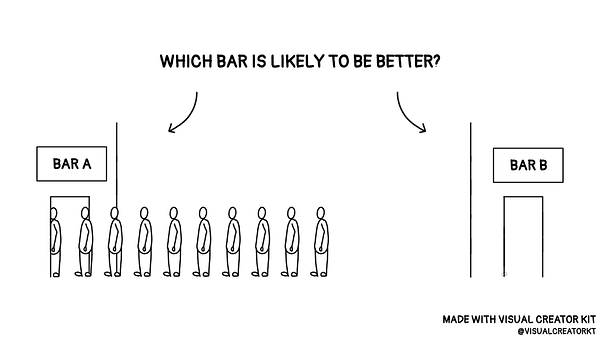Hello Folks 👋,
Welcome to Wisdom Letter 126.
Today we continue to talk about models that help build influence.
These are techniques that can help sway the undecided and even an opponent to agree on the most disagreeable subjects.
The same techniques also help us in situations where we are under influence and feel almost powerless.
These models work because we humans are predictably irrational.
These models find their roots in the basics of behavioral sciences that can help us create influence beyond rational thinking.
Inspired by the phenomenal book Influence By Robert Cialdini, we cover the 6 models of persuasion
In our last edition, we talked about
Reciprocity
Consistency
Likeability
Today we are talking about
Social Proof
Authority
Scarcity
Let’s dive in👇
Scarcity 💎
The What
“People want more of what they can have less of”
When resources are considered scarce, their perceived value increases.
The How
In our hunter-gatherer days, the knowledge of the scarcity of any resource would push our ancestors to rush to hoard those resources.
Our brain still perceives the scarcity in the same manner - This little piece of hardware has not evolved to the digital age, not yet.
We rush to access the resources that we perceive as scarce - even if it means paying a higher price (in terms of time, money, and effort) for it.
The Where
This principle is abundantly used by retailers.
This is the truth behind those “Limited period offer”, “Only 4 available in stock”.
Note that this model gives the desired results when we believe the scarcity to be true. Once you know that scarcity is made up, it does not have the same influence.
The Learning
Next time when you want people to act on your request - emphasize what scarcity are they acting towards- Time, money, resource, opportunity.
It could be a scarcity of time to pitch your million-dollar idea to your boss before he leaves on a long vacation, or it could be a potential scarcity of funds if the deal does not go through.
Authority 👸
The What
We are wired to follow the authority.
When we perceive somebody to be an authority we are more likely to follow through on their recommendation without much doubt.
Note that it is the perception of authority. It has little to do with your actual knowledge or expertise in the domain.
The appearance of authority is enough
The How
We are trained from birth to obey the right authority. This is embedded in our parenting, teaching, and above all - our religion.
From very early on, we are rewarded for obedience and punished for disobedience of the authority.
This is so deeply ingrained that even when there is no reward or punishment, we find it hard to defy authority - even if it means giving fatal shocks to a random stranger.
The Where
This is widely seen when we rush to buy products endorsed by celebrities - we associate their expertise to that of the product.
Our default reaction - If this influential person is saying that this product/service is good - it must be.
It also works in a big way in smaller things in life
For example, in a doctor’s clinic supposed minor things like her Lab coat, her nameplate with all the titles and designations on her office’s entrance, a wall adorned with past accolades and awards - Together increase the degree of our perception of the doctor as an authority.
A lab coat does not make her a better doctor, neither does the show of awards and titles. The only thing these details change is our perception of the doctor.
And this is what forces us to act on the advice she gives.
Our inability to defy an authority jumps us into action.
The Learning
Pay attention to smaller cues that can help establish authority or maybe working against the perception of your authority.
Be mindful of this when someone with authority endorses something. Use critical thinking to question their incentive to endorse something.
It may be a perception of expertise and not a real one.
Social Proof 👨👨👦👦
The What
The way we define what is correct is to find out what others think is correct.
The more people we see following a certain behavior, the more we perceive this behavior to be correct.
The How
As a species, we were able to conquer the world by working together in a group. As individuals, we would have been eaten by the lions of the savannah.
Following the group forms an integral part of how we think and act.
We have evolved to learn that our likelihood to go wrong is less when we behave like our peers.
Behaving differently than our peers is more likely to bring trouble.
The Where
The ratings that we see on ecom websites are social proof that it has been endorsed by so many of our kind.
The more likes on a social media post invite even more likes.
Rash driving, littering, social etiquette are all governed by the behavior we see in our peers.
The Learning
Use social proof to emphasize your point wherever possible.
If you are an activist trying to make people save more electricity, show them how well their peers have done.
If you have a website, add sections like customer reviews and ratings to nudge the visitors to action.
If you are an executive and want to implement a policy at your organization, show examples of how it has helped others in the industry.
Also learn this model to safeguard against social proof.
Be always mindful of any action that is performed by many. Just because everybody is doing it, does not make it alright.
Do your due diligence before you follow the herd.
Conclusion
One common thing that governs all these models is that they are all based on the way our brain (the hardware) functions.
This powerful organ has not evolved at the pace at which our environment has evolved since our hunter-gatherer days.
It still believes it is in the African savannah and acts accordingly.
But our mind, our software, should know better. We need to constantly upgrade our software to match the realities of the real world.
And learning the way this hardware operates is one way to tame this wild beast.
Learn More
📜Read
🐦 Scroll
Social Proof


Scarcity


Authority


📺Watch
🤝Related
This Week Last Year - 2021
This Week - 2020
Important Update
We would appreciate it if you can move us to your primary inbox.
This year we’re doubling down on building thinking tools for busy professionals.
We cut through the noise and find the gems from the internet that will help you think better and live better.
And in the process help you transform your life and become the best version of yourself.
We don’t want you missing any emails just because the email went in your promotions tab.
Also, if you’ve signed up recently, do tell us what is the 1 thing you want us to focus on in 2022, what are your expectations from us, we would do our best to live up to them.
Cheers,
Ayush & Aditi





